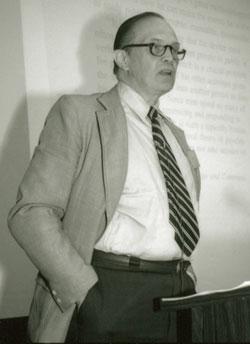Related Research Articles

Albert Bandura was a Canadian-American psychologist. He was a professor of social science in psychology at Stanford University.

George Armitage Miller was an American psychologist who was one of the founders of cognitive psychology, and more broadly, of cognitive science. He also contributed to the birth of psycholinguistics. Miller wrote several books and directed the development of WordNet, an online word-linkage database usable by computer programs. He authored the paper, "The Magical Number Seven, Plus or Minus Two," in which he observed that many different experimental findings considered together reveal the presence of an average limit of seven for human short-term memory capacity. This paper is frequently cited by psychologists and in the wider culture. Miller won numerous awards, including the National Medal of Science.
Robert Bolesław Zajonc was a Polish-born American social psychologist who is known for his decades of work on a wide range of social and cognitive processes. One of his most important contributions to social psychology is the mere-exposure effect. Zajonc also conducted research in the areas of social facilitation, and theories of emotion, such as the affective neuroscience hypothesis.
Robert Perloff was an American psychology and business administration professor emeritus, who taught at Purdue University and the University of Pittsburgh. He was a president of the Association for Consumer Research and the American Psychological Association.

Claude Mason Steele is a social psychologist and emeritus professor at Stanford University, where he is the I. James Quillen Endowed Dean, Emeritus at the Stanford University Graduate School of Education, and Lucie Stern Professor in the Social Sciences, Emeritus.
Richard J. Shavelson is an American educational psychologist who has published over 100 research articles and books in the fields of educational assessment, psychology, and science education. He is an emeritus professor in the Stanford University Graduate School of Education, a former dean of the Stanford School of Education, and a past president of the American Educational Research Association.

Lisa Feldman Barrett is a Canadian-American psychologist. She is a University Distinguished Professor of psychology at Northeastern University, where she focuses on affective science. She is a director of the Interdisciplinary Affective Science Laboratory. Along with James Russell, she is the founding editor-in-chief of the journal Emotion Review. Along with James Gross, she founded the Society for Affective Science.
Gordon Howard Bower was a cognitive psychologist studying human memory, language comprehension, emotion, and behavior modification. He received his Ph.D. in learning theory from Yale University in 1959. He held the A. R. Lang Emeritus Professorship at Stanford University. In addition to his research, Bower also was a notable adviser to numerous students, including John R. Anderson, Lawrence W. Barsalou, Lera Boroditsky, Keith Holyoak, Stephen Kosslyn, Alan Lesgold, Mark A. Gluck, and Robert Sternberg, among others.

Neal Elgar Miller was an American experimental psychologist. Described as an energetic man with a variety of interests, including physics, biology and writing, Miller entered the field of psychology to pursue these. With a background training in the sciences, he was inspired by professors and leading psychologists at the time to work on various areas in behavioral psychology and physiological psychology, specifically, relating visceral responses to behavior.

Robert Richardson Sears was an American psychologist who specialized in child psychology and the psychology of personality. He was the head of the psychology department at Stanford and later dean of the School of Humanities and Sciences there, continued the long-term I.Q. studies of Lewis Madison Terman at Stanford, and authored many pivotal papers and books on various aspects of psychology.
Quinn Michael McNemar was an American psychologist and statistician. He is known for his work on IQ tests, for his book Psychological Statistics (1949) and for McNemar's test, the statistical test he introduced in 1947.

Mahlon Brewster Smith was an American psychologist and past president of the American Psychological Association. His career included faculty appointments at Vassar College, New York University, University of California, Berkeley, University of Chicago and University of California, Santa Cruz. Smith had been briefly involved with the Young Communist League as a student at Reed College in the 1930s, which resulted in a subpoena by the U.S. Senate in the 1950s. That activity caused him to be blacklisted by the National Institute of Mental Health for ten years without his knowledge.
Patrick Henry (Pat) DeLeon is an American psychologist, former chief of staff for United States Senator Daniel Inouye and past president of the American Psychological Association (APA). He became an aide for Senator Inouye in 1973, when Inouye served on a committee investigating the Watergate scandal, and remained on the senator's staff for 38 years. After DeLeon's daughter survived meningitis in 1984, he was involved in the establishment of the Emergency Medical Services for Children program. DeLeon helped to create the nursing and pharmacy schools at the University of Hawaiʻi at Hilo.
Giuseppe (Joseph) Dominic Matarazzo is an American psychologist and a past president of the American Psychological Association (APA). He chaired the first medical psychology department in the United States and has been credited with much of the early work in health psychology.

Ronald F. Levant is a psychologist, a professor, and a former president of the American Psychological Association (APA). After earning an undergraduate degree at the University of California, Berkeley, Levant completed a Doctor of Education (EdD) at Harvard University. He also holds a Master of Business Administration (MBA) from Boston University.
Donald George Marquis was an American psychologist and a past president of the American Psychological Association (APA). He was best known for his tenure as a department chair and professor at the University of Michigan.

Matthew D. Sacchet is a neuroscientist, Associate Professor of Psychiatry, and Director of the Meditation Research Program at Harvard Medical School and Massachusetts General Hospital. His research focuses on advancing the science of meditation and includes studies of brain structure and function using multimodal neuroimaging, in addition to clinical trials, neuromodulation, and computational approaches. He is notable for his work at the intersection of meditation, neuroscience, and mental illness. His work has been cited over 6,000 times and covered by major media outlets including CBS, NBC, NPR, Time, Vox, and The Wall Street Journal. In 2017 Forbes Magazine selected Sacchet for the “30 Under 30”.
Leah H. Somerville is an American psychologist who is a professor at Harvard University. She is a member of the Human Connectome Project. Somerville was awarded the 2022 National Academy of Sciences Troland Research Award.
Amado M. Padilla is an educator known for his research on academic resiliency, acculturation and related stress, second language learning and bilingualism. Padilla is Professor of Psychological Studies in Education and Associate Dean at the Stanford Graduate School of Education.

Carl Weems is a Professor and Chair of the Department of Human Development and Family Studies at Iowa State University. Previously, he was a professor at the University of New Orleans.
References
- ↑ "Ian H. Gotlib".
- ↑ "Ian Gotlib | Department of Psychology". Archived from the original on 2016-03-11.
- ↑ "psycnet.apa.org".